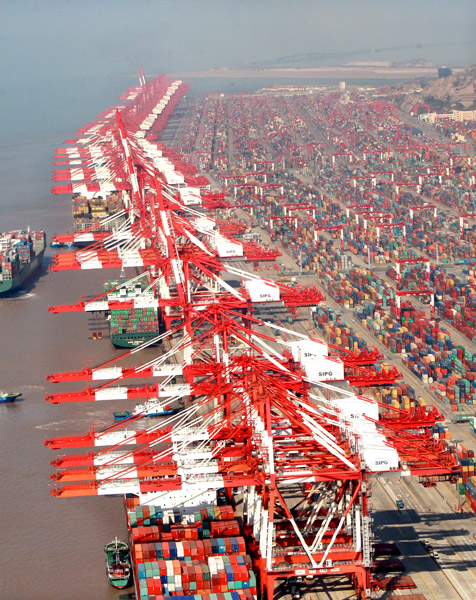FTZ plays key role in opening-up

Government to grant more powers to pilot free trade zones to conduct reform
 |
| Cranes load and unload containers at a busy port within the China (Shanghai) Pilot Free Trade Zone. [Photo/Xinhua] |
As one of the major aspects of further opening-up, the China (Shanghai) Pilot Free Trade Zone has attracted a large number of international industry leaders to set up operations there, providing substantial help to their development in the country.
During the ongoing 19th National Congress of the Communist Party of China, General Secretary Xi Jinping reiterated the importance of free trade zones in a report delivered at the opening session.
Xi said the government will grant more powers to pilot FTZs to conduct reform, and explore the opening of free trade ports.
Meanwhile, the government will adopt policies to promote high-standard liberalization and facilitation of trade and investment, significantly ease market access, further open the service sector, and protect the legitimate rights and interest of foreign investors.
"All businesses registered in China will be treated equally," Xi said.
As one of the first foreign banks to set up within the Shanghai FTZ, Citibank China has witnessed a number of pioneering and innovative policies in the financial sector over the past four years, according to Pei Yigen, country head of treasury and trade solutions for the bank.
"These innovations have helped with further opening-up in the financial market of Shanghai, and even nationwide," he said.
"We are delighted to see that a growing number of multinational companies have set up their Asian accounting and financial centers in Shanghai, and more specifically in the Shanghai FTZ."
Last year, Citi China overtook all other domestic and foreign banks with operations in the Shanghai FTZ in terms of the settlement volume of cross-border capital pool business. It also took up 49 percent of the total market value of the cross-border centralized collection and payment business in the zone.
"The establishment of the Shanghai FTZ has provided a new path for foreign banks in China," Pei said. "We are able to come up with more innovations in our businesses and products.
"Over the past four years, we have helped many multinational companies to enhance the function of their regional headquarters by moving their regional and even global renminbi capital center to Shanghai. We would like to contribute more to the real economy with the platform provided by Shanghai FTZ."
World-leading automation technology provider Festo, which is headquartered in Esslingen, Germany, has its Chinese operation located in the Shanghai FTZ.
According to Thomas Pehrson, the company's general manager in China, the many reform policies in the zone, especially in the customs sector, have largely reduced its burden and enabled the company to deliver the products and services globally with lower cost.
"Benefiting from reform and innovations in the Shanghai FTZ, Festo is planning for adjustment in our business in the Asia-Pacific region," he said.
"Festo China's automation manufacturing plant located in the Shanghai FTZ will shift its focus from manufacturing to research and development, as well as delivery.
"The existing production center and R&D center in China will be expanded into Festo's Asia-Pacific logistics center and customized production center," he added.
- Authorities urged to prepare as cold wave hits Central China
- Explosion at Baotou steel plant kills 2, 5 missing
- Multiple injured rescued after factory explosion in China's Baotou
- Beijing activates emergency responses to ensure safety
- Beijing witnesses snowfall
- Tongji University's Wu Jiang assumes presidency of architects' Asia council




































